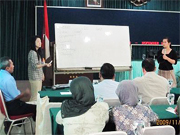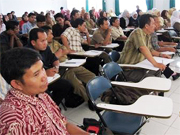- Home
- Technical Cooperation Projects
- Index of Countries
- Asia
- Indonesia
- Program for Enhancing Quality of Junior Secondary Education
- Project News
- Implementation of the Workshop to Facilitate the Understanding on Lesson Study
Project News
2009-12-24
Implementation of the Workshop to Facilitate the Understanding on Lesson Study
 Science teachers attending the workshop in Kab. Pasuruan
Science teachers attending the workshop in Kab. Pasuruan
 Science teachers attending the workshop in Kab. Sumedang
Science teachers attending the workshop in Kab. Sumedang
The reference sites in Jawa, Kabupaten Sumedang, Kabupaten Bantul, and Kabupaten Pasuruan have started Lesson Study since SISTTEMS, the predecessor project of PELITA. Thus, these three Kabupaten are more experienced in Lesson Study than the other three new sites in PELITA. In Kabupaten Sumedang, Bantul and Pasuruan, opening classes to other teachers which is quite rare in Indonesian schools has become usual practices, and teachers regularly gather at MGMP (Subject Teacher Training Forum) to go through the Plan-Do-See cycle of Lesson Study together. The number of school-based Lesson Study schools (LSBS) in which all teachers at school participate in Lesson Study regardless of subjects is also increasing. These things are epoch-making in the history of educational development in Indonesia. However, can we take it granted that these changes automatically bring the actual improvement of the quality of classes? Do children learn better and understand better in classes?
Through monitoring open classes in the reference sites, JICA Experts found out that there was still a long way to go from “Lesson Study becoming a routine work” to “actual improvement of teaching and learning quality”. Still, quite a few numbers of teachers have misunderstanding on the definition of Lesson Study and good lessons. Thus, JICA Experts decided to implement a one-day Workshop targeting all teachers attending MGMP in three Kabupaten in the reference sites to input them the correct definition of Lesson Study and good classes once again. Of course, only 1-day of the workshop cannot clear up all the misunderstandings teachers still have after more than two and half years of Lesson Study activities. However, JICA Experts felt that if they did not clear up some of the misunderstandings in the reference sites which would be the reference to all schools in Indonesia at this moment, it would be difficult to disseminate Lesson Study activities as an effective tool to improve the quality of class in near future.
In the Workshop, JICA Expert explained what Lessons Study was and what the cycle of Plan-Do-See in Lesson Study was by using videos once again. Then, teachers asked questions they had in their daily Lesson Study activities, and JICA Experts tried to resolve misunderstandings teachers had by answering their questions. There were mainly six misunderstandings JICA Experts tried to clear up in the Workshop.
Misunderstanding1: Lesson Study is a Teaching Method/Model
Some Indonesian teachers think that Lesson Study is a teaching method or model, so they think they have to stop applying other teaching methods/model if implementing Lesson Study, or applying group works in the class is the Lesson Study. JICA Experts explain that Lesson Study is a cycle system (Plan-Do-See) in which teachers improve their specialty and teaching ability through observing and reflecting from daily classes. Teaching methods/models can be out of date, but Lesson Study cannot be out of date because it is a learning cycle. Lesson Study can be continued as long as there is a cycle system and the place where teachers get together, even if teachers change the teaching methods/models.
Misunderstanding 2: A Class Implemented as What RPP (Lesson Plan) Said is a Good Class
There is a misunderstanding that a class implemented as it was planned is a good class. However, a class is deemed to change moment to moment based on how each student reacts on what teacher says. JICA Experts explain that it is important to plan considering children’s response such as where children have difficulties and how to deal with the difficulties children have. If children responded in an unexpected way, teachers need to change their plan promptly so that the class can facilitate children’s learning most effectively, rather than preceding the class as it was planned.
Misunderstanding 3: Teachers Shouldn’t Explain
Traditional Indonesian classes have been lecturer style. In these classes, children were taught new knowledge by teachers by memorizing new things. Children were always passive. Currently, it is in the transition period from the traditional way of teaching to child-centered. Teachers started to recognize the importance of children learning and understanding new things or different way of thinking by exploring. In this process, some teachers misunderstand that teachers should not teach or explain. Teachers should not correct wrong answers unless children themselves found out the mistakes. Due to this misunderstanding, children lose their way to go during the class and spend the time in vain because teachers do not explain what students need to know before they explore and do not instruct the purpose enough before students start experiment.
Misunderstanding 4: LKS (Student Work Sheet) is a Must in Lesson Study
There is a misunderstanding that the class which applies LKS is the good class or if we do Lesson Study we must use LKS. However, the point is whether children are learning or not. In some classes, children learn better by utilizing text books or by answering questions on the notes rather than working on LKS depending on the contents of the class. The purpose of using LKS is to facilitate children’ learning and understanding, but in some cases, using LKS itself becomes the purpose. Moreover, in most classes, LKS answered by each group or each student are collected at the end. So, after class, there is nothing left to children to review what they have learned as they only write in LKS and do not take notes.
Misunderstanding 5: Group Work is a Must in Lesson Study
Some teachers think that discussion among students can occur if there is a group work in the class, and if there is a discussion, it is a good class. Such teachers only distribute LKS, telling children to follow what is written in the LKS, and most part of the 80-minutes class is used for group work. That is a typical open class in Indonesia. Also, there is a misunderstanding that 1 LKS for one group is better to make children discuss each other than one LKS for one student, because one student with one LKS will individually work on it without discussion. Here again, the focus is not on whether children can learn from discussion, but on discussion and group work itself. In such cases, reflection also become very superficial as they only talk about who was active and not active, not talking about who could learn, or what was learned by students. JICA Experts explain that group work should be utilized as a tool to facilitate learning of each student. It is important for teachers to improve the capability to judge, moment by moment in a class, which can be the most effective way, either individual work, group work, or whole class lecture. JICA Experts also explain that there are two kinds of learning through discussion; the first one is “having his/her own opinion or answer, and ironing out differences”, and the other is “calling for help when he/she cannot solve the problem individually”.
Misunderstanding 6: Utilizing High-Tech Media Such as LCD is Good
There are many teachers who use LCD only on the occasion of open class. Media should be chosen, considering with which media children can learn most. If we have to kill a lot of time in the class just to use unaccustomed LCD, we do not need to use it. Indonesian teachers can utilize blackboard more effectively. It is important to write the objectives or key points of the class, and make children write it on their notes. It is also important to explain by drawing a figure and graph on the blackboard. By doing this, teachers can facilitate students’ learning without using high-tech media.
Workshops were conducted, divided into two subjects (Math and Science), in each of three kabupaten, and 968 teachers attended in total. What is Lesson Study and what is good class are very deep theme. Although it was only one-day workshop for a great number of teachers at one time, it could answer questions of teachers directly and it could resolve some of the misunderstandings. For Lesson Study, it is important to progress step by step, not change drastically, but change continuously.
- About JICA
- News & Features
- Countries & Regions
- Our Work
- Thematic Issues
- Types of Assistance
- Partnerships with Other Development Partners
- Climate Change / Environmental and Social Considerations
- Evaluations
- Compliance and Anti-corruption
- Science and Technology Cooperation on Global Issues
- Research
- JICA Development Studies Program / JICA Chair
- Support for the Acceptance of Foreign HRs / Multicultural and Inclusive Community
- Publications
- Investor Relations
